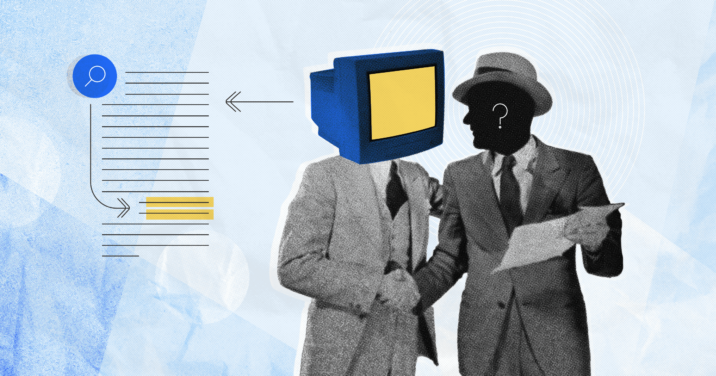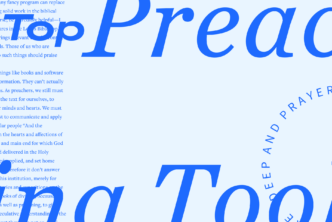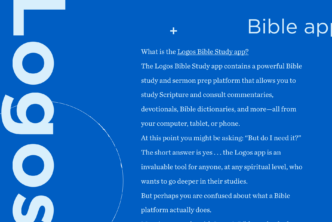When I first began teaching others how to use Bible software in the early 2000s, I actually had a stock joke that Logos was building a sermon generator that would produce both exegesis and illustrations. It wasn’t a very funny joke then; now it’s not a joke at all. AI can do this.
But what does the advent of AI mean for the sacred task of preaching the Word? If indeed preaching is “truth through personality,” as Philips Brooks famously said, what role should Large Language Models (LLMs) play in the production of sermons, or in Bible study more generally?
Many Logos users have been asking us questions like this. Logos’s own Phil Gons is working on a technology theology/philosophy statement for us; I and Mark Barnes are writing more theological visions for the Christian use of AI. I, in particular, wish to add in some interaction with relevant thinkers. I’d like to describe what’s influenced our approach at Logos, and how we’re navigating this topic as a for-profit company that is dedicated to serving the church.
Hopeful entrepreneurial pragmatism
John Dyer has an Oxford title called People of the Screen: How Evangelicals Created the Digital Bible and How It Shapes Their Reading of Scripture.1 The book is recent, but it’s based on dissertation work from several years prior—and on interviews done several years before that. I’ve been at Logos for nine years, but Dyer’s interviews with Logos employees, as reported in the book, actually occurred before I arrived. So some of the sentiments attributed to Logos felt a little out of date.
But one catchy criticism Dyer issued toward the kind of people who work at Logos hit home. It was encapsulated in a phrase Dyer used to describe our (and other generally evangelical folks’) approach to technology: “Hopeful Entrepreneurial Pragmatism.” “HEP,” he called it.
Hopeful
Yeah—that’s kind of us. When American evangelicals (like those who tend to predominate at Logos) encounter new technologies, we have historically seen them as neato opportunities for gospel advance and not as threats to the natural order of things. My own father wrote a book for Baker called Air of Salvation: The Story of Christian Broadcasting which chronicled earlier evangelicals’ eager foray into the then-new technology of radio—a medium in which Christians still have a strong presence. Christians have adopted plenty of other technologies over time, from the codex to the printing press. Church historians have speculated that the difference between Luther’s success and that of Jan Hus was that the former came after Gutenberg.
Entrepreneurial
Evangelicals have also been entrepreneurial: major Christian media ministries have used all kinds of giveaways and promotions to keep donations coming in; and we at Logos have quite obviously built a business around the distribution of Christian ebooks (plus powerful tools to make them more useful to Bible students). Those who work here know that there is a widespread feeling that we’re performing an important mission, that money is just the grain that the oxen eat while we’re serving the church. Dyer sees some tension between the business and ministry aspects of our mission; he’s not wrong. But it works: our customers get excellent software and resources, and we get capital to build more of those things.
Pragmatism
“It works.” Does that mean that the Christians at Logos are also “pragmatists”? We’d be foolish not to acknowledge the possibility. Indeed, did I do wrong to “cherry pick” references to ἀγάπη (agape), a major subject of my dissertation, from the easily searchable resources in my Logos library rather than reading carefully through all those books in order to discover those references? Have digital Bible students like me, as Dyer alleges, let the pragmatic ease of digital encounters with Scripture color our interpretation of God’s Word?
This third word in Dyer’s acronym seems to be where the rub is. Are evangelicals hopping blithely into Whatever Works without stopping to think deeply about the long-term ramifications of our chosen tools? Which brings me back to my stated theme: Does pragmatic, immediate adoption of AI have hidden dangers that ought to diminish our (evangelicals’ and Logos’s) hopefulness and entrepreneurialism?
The story of God
I want to lay some theological groundwork for answering this question. Simply put: because the Bible’s story starts with a very good creation and not with a fall, I expect all technologies to be fundamentally good before they’re bad, or good “underneath their bad.” Unavoidably, I will get specific here in ways that not even all Logos employees will agree with. But considering that I’m about to cite a centrist evangelical Wesleyan who fishes in Calvinistic streams, I hope I have at least my evangelical Protestant bases covered.
Indeed, Andy Crouch—and the Kuyperian/Bavinckian/Dutch Reformed tradition that Crouch, a Wesleyan, has helped popularize—has had particular influence on me. His main trilogy of books includes Culture Making: Recovering our Creative Calling; Playing God: Redeeming the Gift of Power; and Strong and Weak: Embracing a Life of Love, Risk and True Flourishing. And in those books he repeatedly mines the biblical story of creation, fall, and redemption for insight into our lives as culture makers.
Creation
All Crouch’s books present a biblical vision of a world that God created to be very good, and of a cultural mandate (Gen 1:26–28) that blessed humans to make something of that very good world. Even non-Christians are constantly (though not universally) multiplying and filling the earth; they’re subduing it and having dominion over it in often good ways. It’s not only Christians that have harnessed the God-given power of the sun, or of electricity; it’s not only Christians who have built beautiful buildings and laid pipes to silently carry in water and carry out waste. When we use our God-given gifts—our powers of reason and our physical strength, even the raw materials of this world and the laws of nature that govern them—to make something of our world out of love for God and neighbor, we are using power in the way God designed. We are promoting what is now often called “human flourishing.” When we use our strengths at Logos to take risks for the good of others, like building a new sermon-preparation tool and bringing it to market (even though we sometimes fail), we are promoting that same flourishing. That’s the Christian doctrine of creation.
Fall
The fall, of course, is equally necessary to the metanarrative to which biblical Christians are necessarily committed. The fall has given our work frustrating thorns and thistles—at Logos, we call them “software bugs.” It has also made it possible for the power of Logos to be used for plagiarism, or for yanking Bible verses out of their contexts, or for citing “the Greek” when actually a given preacher is just putting forth his own ideas. The fall makes us all at Logos less than perfectly ideal colleagues; it makes money a danger; it makes it possible for us to be pragmatic in ways that are unwise or even sinful. The fall of man all those millennia ago is the reason we can’t just say, “If AI exists, it must be good.”
Redemption
But the biblical metanarrative is not a tragedy but what the ancients called a “comedy”: it has a happy ending. The power of God’s redemption enters the Genesis story immediately in the protoevangelium (Gen 3:15), and it culminates in Jesus’s death and resurrection for human sin. Those who live in the fallen flesh cannot please God (Rom 8:8); but it is possible, through the risen Christ, to do true good again. And Christ the King will not only redeem and restore the individual human soul; he promises that our redemption will mean the freedom of creation from its “slavery to corruption” (Rom 8:21). Crouch points out in Culture Making that the narrative of Scripture moves from garden to city: the kinds of development we tend to call “technological” will not be undone but instead restored, even redeemed, in the New Heaven and New Earth.
Crouch is careful to warn that the fall means that we cannot, as mere humans, expect our good works to last, or to have only good effects. Only Jesus can have those expectations (Logos is, no doubt, used by some false teachers). But we are, nonetheless, called to make something of our world, to make more artifacts of human culture,2 to uncover the potentialities God “programmed” into creation.
One of which is the massive collection of 1s and 0s that we call AI.
The discovery of AI
The capacity for “artificial intelligence” is not something humans invented; it’s something we discovered. Biblically speaking, the base technologies that come together to form AI were part of the “very good” creation of Genesis 1. Every law of nature that AI assumes, every bit of silicon and of metal that data centers use, every logical relationship on every motherboard—rests on the bedrock of divine creation. And all our discoveries of the power in these created things is the result of the cultural mandate, the creation blessing that God gave to all of the progeny of our first parents:
Then God said, “Let us make man in our image, after our likeness. And let them have dominion over the fish of the sea and over the birds of the heavens and over the livestock and over all the earth and over every creeping thing that creeps on the earth.”
So God created man in his own image,
in the image of God he created him;
male and female he created them.And God blessed them. And God said to them, “Be fruitful and multiply and fill the earth and subdue it, and have dominion over the fish of the sea and over the birds of the heavens and over every living thing that moves on the earth.” (Genesis 1:26–28 ESV)
We, who are created in the image of a creator God, are blessed to be able to create. And what we create when we’re at the height of our powers is, not surprisingly, something in our own image: an “intelligence,” an intelligence that is the result of our own “artifice”—our capacity for making pieces of technological art. We can only do this because we ourselves have been given intelligence from an even higher source.3
Fundamentally, then, the base technologies that make up AI are good. Very good. We were mandated—and blessed—as a species to explore (not exploit) the God-honoring, neighbor-loving uses of creation. As Crouch says,
Thousands of years after Genesis was written, we can see in a way its first readers could never have imagined just how much capacity these human image bearers had to fill the earth—just how much power was ultimately available to them, coiled in the physical elements’ chemical and nuclear bonds, and emerging from the incredible complexity of the human mind and the fecundity of human culture.4
The real question comes when we ask how the fall has affected—has twisted or bent—the set of tools we call AI. Garbage in, garbage out; and humans can take good things and make them garbage. What human-created untruths lie festering in AI datasets? What God-dishonoring biases have we either taught our AI models or failed to remove from them? Now that AI is being used in the real world, what fallen tendencies of mankind is it exacerbating? We’re finding all this out as this new technology starts to work out its implications in our various human cultures.
Twisted AI
Some wise Christian culture watchers, such as writer Samuel James (author of the thought-provoking Digital Liturgies), have warned us that the internet is an “epistemological habitat,”5 that the web has “heart-shaping effects.”6
Non-Christian writers on tech themes, too, such as Nicholas Carr, have warned us that Google may be making us stupid. An earlier writer who wrote incisive criticisms of media culture, especially regarding television, was Neil Postman, author of Amusing Ourselves to Death and Technopoly.7
It would be foolish to ignore the questions posed by these thinkers, especially as we consider the newer technologies of AI. Postman argued that technologies will always play their hand; they will manifest their inner tendencies in a way that only hindsight will truly see. FedEx overnight delivery initially made people in the publication industry breathe a sigh of relief: Now we’ll be able to meet our deadlines more easily without having to wait for page proofs. Of course overnight delivery played its hand and did the opposite: it simply ramped up expectations for tighter deadlines.
What will AI do to us, negatively speaking? What dark parts of its future can we see now? Certain of its dangers are already obvious, from faked nude pictures of celebrities to laziness and arrogance.
AI laziness: preachers, don’t have AI write your sermons. Don’t outsource Scripture memory to it (or to Logos, for that matter). There are some things that you ought to know in your own frontal lobe, which is not a data center. Speaking of which …
AI arrogance: AI is not the next step in human evolution; nor does it actually rival the human brain in its power and complexity. There will be no gotcha line at the end of this piece revealing that it was actually written by a Christian AI bot. I assure you (as does my wife), I am all too human.
Some of AI’s dangers are less obvious, and it takes perceptive people to spot them. Jeffrey Bilbro, professor of English at Grove City College, seems to be such a one; his essay on AI in Plough points especially to the ways AI alters the pain/gain calculus. The reason preachers shouldn’t have AI write their sermons is that pushing through “preacher’s block” seems to be necessary to growing as writers and thinkers, as Bilbro argues persuasively. Writing produced by AI is very commonly too cute by half (Bilbro points out: do we really need a Shakespearean sonnet on climate change?), painfully anodyne (“I’m not sure accelerating the production of pointless text solves the problem of its abundance,” Bilbro says), or confidently wrong.8 Do sermons need more of these features?
Andy Crouch, too, points to the ways in which the invulnerability one has in a video game, for example (you’re not actually going to be hurt by the bullets flying at you; only your avatar will “die,” and he’ll be back in a moment), can be enervating, inimical to the development of the true and lasting strengths that teenage boys need to be forming for their futures as husbands and fathers.9
At Logos, therefore, we’ve been careful not to talk about AI as a replacement for hard work, but as a facilitator of it. AI isn’t radically and materially different from some of the other efficiency-enabling tools Logos has included for years. For example, perhaps it would be helpful for my Hebrew skills to be required to parse all verbs myself, or to do my own original-language transliterations instead of using the Text Converter tool. Maybe, as Bilbro points out, having to go to my shelf to pull down commentaries—instead of using the rather convenient Logos Passage Guide—would produce moments of homiletical serendipity as I stumble on volumes I hadn’t thought to consult.
But the fallenness inside any technology does not erase the created goodness that is, to borrow a phrase from Lewis, “even deeper magic.” Making my work more efficient may make me lazy, but it doesn’t have to. I made the decision many years ago to outsource specific exegetical tasks such as these to Logos, and I haven’t regretted my choices. Our users, too, are readers; they’re educated and intelligent. I believe they can face these trade-offs honestly. We at Logos intend to put powerful Bible study tools in place, offer some suggested guidance as we have always done, and leave the work-AI balance to our users.
The Place of Technology in the Story of God
Sounds pretty HEPpy, I acknowledge. But if we evangelicals have Hopeful Entrepreneurial Pragmatism, it’s because we believe that creation and redemption overwhelm fall, that grace can restore nature even now, before the Father puts everything under Christ’s feet, as he “rule[s] in the midst of [his] enemies” (Psalm 110:2). We all need the divine wisdom so often praised in the Proverbs to discern where AI brings truly creative power, the genuine power of Christ to subdue the world and have dominion over the world for the good of the world—and where it brings opportunities for yet more verbal kludge.
I found Dyer’s earlier book, From the Garden to the City: The Place of Technology in the Story of God, very helpful and insightful. Broadly speaking, it saw technology as a God-given gift that, nonetheless, requires discernment: like Neil Postman before him, Dyer argued that “our tools are being developed at a rate faster than our capacity to evaluate their impact.” And yet Dyer—a seminary-trained tech nerd (indeed, the brains behind some great projects such as bestcommentaries.com)—is still willing to say in that book,
Christians who live God-honoring lives in the digital world are those who can discern the tendencies built into all technology and then decide when those tendencies are in line with godly values, and when those tendencies are damaging to the soul.10
In other words, Dyer’s first book argued that it is possible to do some evaluating, to do some discerning—and yet to decide to continue to use digital technologies, despite their acknowledged and even as-yet-unseen downsides. This may be reading between his lines (and my colleague Mark Barnes, who is leading a company reading group on Dyer’s book, disagrees with me here: I’m psychologizing more than may be justified), but People of the Screen seemed to take a bit more dire (sorry!) view of that possibility. The less theological, more sociological eye that Dyer turned on the evangelical use of technology in most of People of the Screen seemed to lead him to lower levels of personal HEP.
I want to get personal here: I tried for years to look at all my tech usage—and my Bible software usage in particular—through the lenses of what’s called “media ecology.” I’ve read Neil Postman; I’ve read Dyer; I’ve read Samuel James; I’ve read Tony Reinke; I even bought an incredibly boring textbook on the topic (that I won’t name), and I made it through some portions! I have seen genuine value in all these books. But several years ago, at the last BibleTech Conference Logos put on, I noticed that a full four or five speakers basically used their speaking slots to caution us sagely about the effects of computers on Bible study—and yet, I noticed, none could get specific. They could only warn in dark tones about the way digital Bible usage is likely to have negative effects. There were few to no persuasive, concrete examples of such effects. Even Dyer, it seemed to me, simply did not demonstrate through his empirical study in People of the Screen that technology alters Bible study.11 Good interpreters use both paper and digital tools well; bad interpreters use both poorly.
I’m 43. I use the tools I use. I’m comfortable with giving up the benefits I’m sure must exist for those who write their sermons on typewriters or with fountain pens.12 I’m more than comfortable with giving up the benefits of (most) paper books—or of handwritten codices, and of scrolls before them. I seem to be a productive member of society despite an entire adult life in which Google has been making me stupid. With confidence that technologies are, at heart, fundamentally good before they’re bad, I will watch myself for the effects of the tradeoffs offered by AI. I’ll listen to wise people who can see the fall in AI better than I can. But I’ll maintain my confidence that all things, including AI, can and will be brought under Christ’s feet.
Titles mentioned in the article
From the Garden to the City: The Place of Technology in the Story of God (audio)
Regular price: $19.99
Strong and Weak: Embracing a Life of Love, Risk and True Flourishing
Regular price: $10.79
Digital Liturgies: Rediscovering Christian Wisdom in an Online Age
Regular price: $13.99
- Oxford University Press, 2022.
- “The only way to change the culture is to make more of it,” Crouch likes to say.
- As my perceptive colleague at Logos, developmental editor of this piece, Jennifer Grisham pointed out, this relationship of creator to created can turn around and work the other way, as Psalm 115:4–8 shows: “Those who make them become like them.”
- Playing God: Redeeming the Gift of Power (Grand Rapids: InterVarsity Press, 2013), 35.
- Digital Liturgies: Rediscovering Christian Wisdom in an Online Age (Wheaton, IL: Crossway, 2023), 61.
- Digital Liturgies, 62.
- Amusing Ourselves to Death: Public Discourse in the Age of Show Business (New York: Viking Penguin, 1985).
- At least AI doesn’t bristle when corrected. But in my experience, it’s just as likely to give another confidently wrong answer when its first answer is shown to be in error.
- See the penetrating comments of Andy Crouch on “Simulated Authority” in chapter 4 of Strong and Weak: Embracing a Life of Love, Risk and True Flourishing (Grand Rapids: InterVarsity Press, 2016).
- John Dyer, From the Garden to the City: The Redeeming and Corrupting Power of Technology (Grand Rapids: Kregel, 2011), 96.
- I admit to this being a bit of a hit and run, because I’m not prepared to engage the details; but I was not persuaded that the question Dyer posed in his study yielded usable results.
- I actually do like using fountain pens for my to-do lists; thank you, former Logos employee Jacob Cerone!





